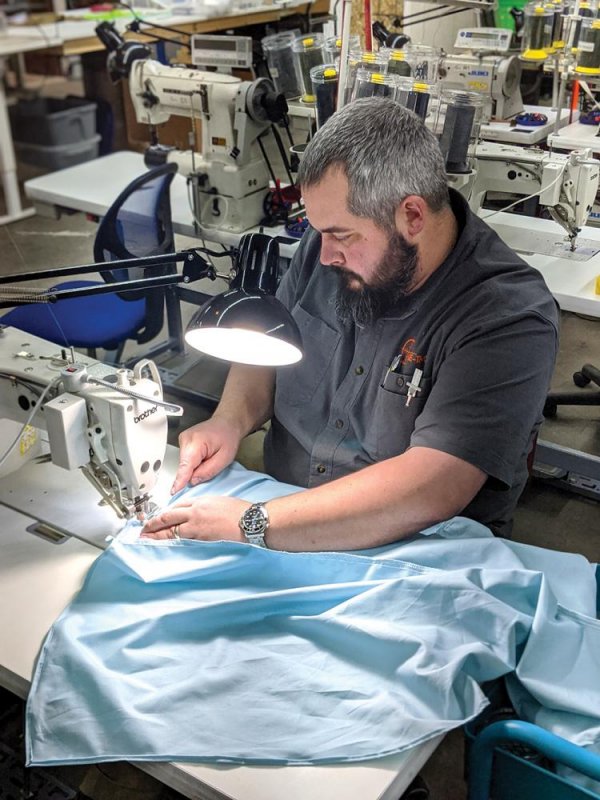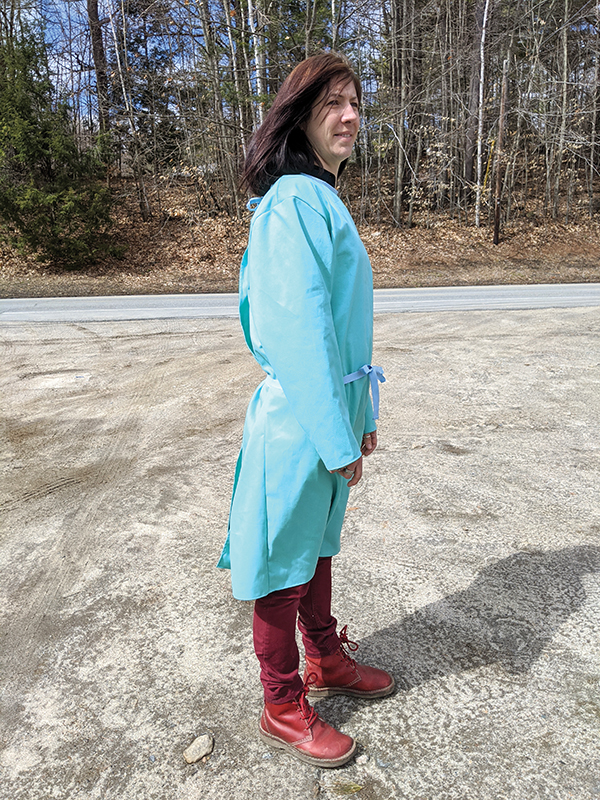
Top right: Cole-TAC co-founder, Dustin Coleman, sewing a hospital gown. Below: A finished gown made by Cole-TAC. Courtesy photo.
What began as a hobby is now a thriving business in Newport. While other businesses fight to survive in the pandemic, Cole-TAC’s challenge is finding enough employees to keep up with its growth.
Since launching the company in 2015 in a spare bedroom with a single sewing machine, the husband and wife team of Dustin and Lee Coleman have been making custom suppressor covers and other tactical accessories for shooting enthusiasts, hunters and law enforcement agencies. (A suppressor cover stops heat haze from distorting the sight in front of a rifle scope.)
It all started when Dustin Coleman, vice president, bought a suppressor cover and it was “destroyed” after using it only once.
“I asked my wife to fix it. She was not happy with what I paid for it and said, ‘I could make one so much better’,” Coleman says.
Lee Colman made one and when Dustin, who worked as a product design engineer at Ruger Firearms in Newport, showed off her handiwork to friends, they started to request their own.
By 2017, the couple bought a facility in Unity and started branching out into other products geared toward the same audience, including canvas gear and ammo bags, shooting mats, and tool and magazine pouches, as well as sewing products for other companies. It also landed a major manufacturer of suppressors as a client.
The company attributes their growth to social media and working with influencers in the gun community. “We find niches that are not well served,” Coleman says. “We focus on competitive long-range shooting.”
 When the pandemic led to businesses closing in March, Coleman was worried Cole-TAC would be deemed nonessential and wanted to ensure his seven employees could continue to work. Seeing a need for masks, Cole-TAC applied its sewing expertise to making masks. It started a GoFundMe campaign to support the launch of the mask project. “We have a customer base that likes to support the military and first responders,” he says, and donations helped cover costs so the company could, in turn, donate 8,500 masks.
When the pandemic led to businesses closing in March, Coleman was worried Cole-TAC would be deemed nonessential and wanted to ensure his seven employees could continue to work. Seeing a need for masks, Cole-TAC applied its sewing expertise to making masks. It started a GoFundMe campaign to support the launch of the mask project. “We have a customer base that likes to support the military and first responders,” he says, and donations helped cover costs so the company could, in turn, donate 8,500 masks.
When Cole-TAC then connected with the State of NH, they discovered the acute shortage of disposable hospital gowns. “We didn’t know what the future was going to hold,” Coleman says. “It would be foolish to let our resources sit idle when they could be used to help.”
The company quickly pivoted to making gowns and almost doubled its workforce to 13, including adding a project manager, investing in new equipment and relocating to a larger facility in Newport. They also secured their first state contract.
Cole-TAC produced 50,000 gowns for the state and secured other smaller contracts outside NH, manufacturing a total of 70,000 disposable gowns. Coleman says it required a different mindset to produce something intended for single use. “What we make is intended to last for years. It was hard to think these were things destined for the landfill,” he says.
As demand waned, Cole-TAC returned to their original business model. And business, he says, is booming. “We are significantly ahead of where we were last year, even taking out the PPE stuff,” Coleman says. The business could grow even faster if he could find workers. “The hard part for us right now is it takes a bit for a person fresh off the street to develop sewing skills. There is quite a learning curve to get someone up to speed,” he says.
And he’s hopeful about the future as he says both the online sales and contract manufacturing business continue to grow.
For more information, visit cole-TAC.com.
